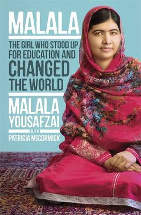Malala by Malala Yousafzai and Patricia McCormick

Hachette, 2014. ISBN 9781780622156.
(Ages: 12+) Highly recommended. War, Fanaticism, Refugees, Taliban,
Islam, Women, Education. Subtitled, The girl who stood up for
education and changed the world no reader can pass by this
book without recognising the young woman staring out from the cover.
Her face and the events surrounding her medical evacuation to
England were on every media report for months, and millions followed
her plight. Shot in the face by a fanatic in the Swat Valley in
northern Pakistan, while on her way home from school, she needed
emergency attention. Her book concentrates initially on the family
and her religion, her day to day life, her school and the increasing
imposition of extremist views in Pakistan. These views that women
should not be educated, that women were not allowed to leave home
without a male relative with them, and only when wearing a full
cover, came to the fore after the devastating earthquake of 2007,
after which some preached that it was a warning from Allah. The ones
who helped those affected by the earthquake were the followers of
the extremist Fazlullah, and they were able to promote their views.
As they grew stronger, fear bubbled through the community, TV sets
were destroyed, polio vaccines rejected, and radio used to attract
followers until many of their ideas became common usage in northern
Pakistan, with opposing people being beaten and killed by the
fanatics. But some spoke out against them, Malala's father, the
school principal amongst others, and Malala too became outspoken
from an early age, talking on the radio, and freely giving her views
on girls' education.
Calls to Pakistan's army fell on deaf ears, and it wasn't until the
Taliban started to be a murderous influence in Islamabad, that the
army moved to act. But it was too late for Malala.
This is a riveting read, not only because it tells younger readers
about this brave young woman and her fight against the tyranny of
fanatics, but also because it speaks to us all about taking a stand
against fanaticism, and coincidentally showing how easily fanaticism
can take a hold on a community. I was constantly reminded of the
rise of Nazism, and echoes of the rise to power of the IS in Iraq
today.
Education is the key to overcoming fanatics like this. We take so
much for granted in the west and this singular book reveals to our
sometimes overprotected students, what lengths people will go to be
educated, and what lengths some will go to prevent it happening.
This could be an adjunct to study alongside the many wonderful
novels set in the Middle East, the novels of Deborah Ellis and
Rosanne Hawke spring to mind. At the end of the book is a glossary,
a timeline of events in Pakistan since partition, a series of book
club questions and information about her current work. A map at the
start of the book sets the story in its place in the world.
Fran Knight